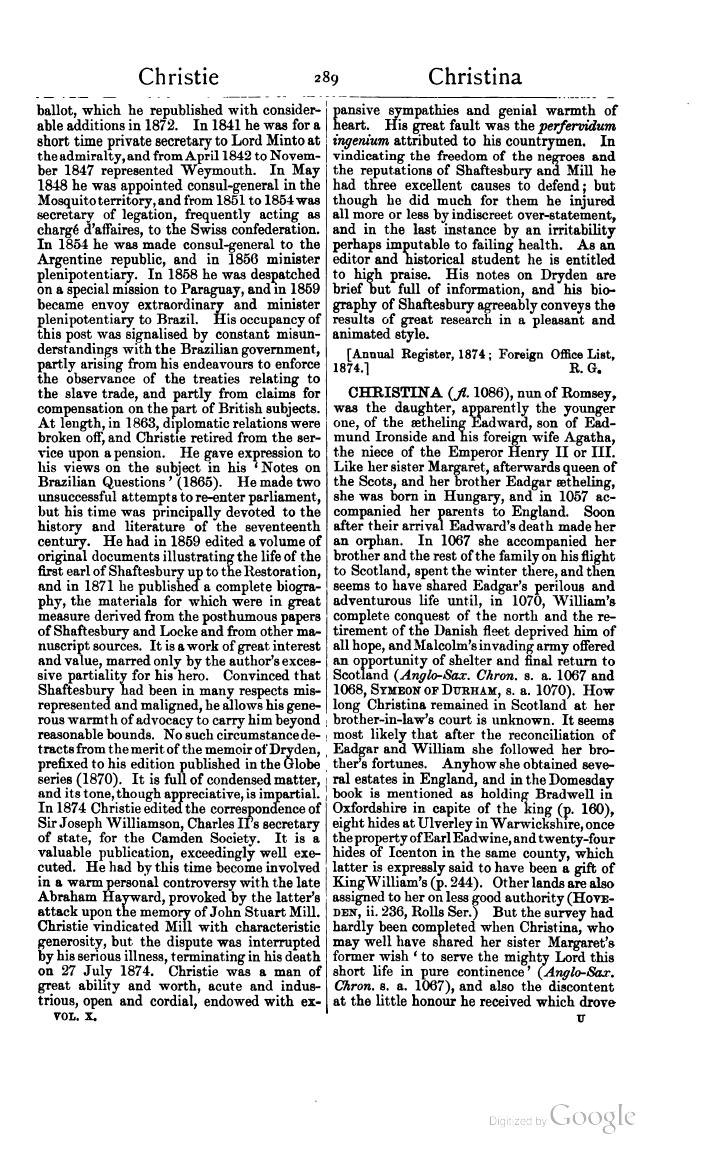ballot, which he republished with considerable additions in 1872. In 1841 he was for a short time private secretary to Lord Minto at the admiralty, and from April 1842 to November 1847 represented Weymouth. In May 1848 he was appointed consul-general in the Mosquito territory, and from 1851 to 1854 was secretary of legation, frequently acting as chargé d'affaires, to the Swiss confederation. In 1854 he was made consul-general to the Argentine republic, and in 1850 minister plenipotentiary. In 1858 he was despatched on a special mission to Paraguay, and in 1859 became envoy extraordinary and minister plenipotentiary to Brazil. His occupancy of this post was signalised by constant misunderstandings with the Brazilian government, partly arising from his endeavours to enforce the observance of the treaties relating to the slave trade, and partly from claims for compensation on the part of British subjects. At length, in 1863, diplomatic relations were broken off, and Christie retired from the service upon a pension. He gave expression to his views on the subject in his 'Notes on Brazilian Questions' (1865). He made two unsuccessful attempts to re-enter parliament, but his time was principally devoted to the history and literature of the seventeenth century. He had in 1859 edited a volume of original documents illustrating the life of the first earl of Shaftesbury up to the Restoration, and in 1871 he published a complete biography, the materials for which were in great measure derived from the posthumous papers of Shaftesbury and Locke and from other manuscript sources. It is a work of great interest and value, marred only by the author's excessive partiality for his hero. Convinced that Shaftesbury had been in many respects misrepresented and maligned, he follows his generous warmth of advocacy to carry him beyond reasonable bounds. No such circumstance detracts from the merit of the memoir of Dryden, prefixed to his edition published in the Globe series (1870). It is full of condensed matter, and its tone, though appreciative, is impartial. In 1874 Christie cited the correspondence of Sir Joseph Williamson, Charles II's secretary of state, for the Camden Society. It is a valuable publication, exceedingly well executed. He had by this time become involved in a warm personal controversy with the late Abraham Hayward, provoked by the latter's attack upon the memory of John Stuart Mill. Christie vindicated Mill with characteristic generosity, but the dispute was interrupted by his serious illness, terminating in his death on 27 July 1874. Christie was a man of great ability and worth, acute and industrious, open and cordial, endowed with expansive sympathies and genial warmth of heart. His great fault was the perfervidum ingenium attributed to his countrymen. In vindicating the freedom of the negroes and the reputations of Shaftesbury and Mill he had three excellent causes to defend; but though he did much for them he injured all more or less by indiscreet over-statement, and in the last instance by an irritability perhaps imputable to failing health. As an editor and historical student he is entitled to high praise. His notes on Dryden are brief but full of information, and his biography of Shaftesbury agreeably conveys the results of great research in a pleasant and animated style.
[Annual Register, 1874 ; Foreign Office List, 1874.]
CHRISTINA (fl. 1086), nun of Romsey, was the daughter, apparently the younger one, of the ætheling Eadward, son of Eadmund Ironside and his foreign wife Agatha, the niece of the Emperor Henry II or III. Like her sister Margaret, afterwards queen of the Scots, and her brother Eadgar ætheling, she was born in Hungary, and in 1057 accompanied her parents to England. Soon after their arrival Eadward's death made her an orphan. In 1067 she accompanied her brother and the rest of the family on his flight to Scotland, spent the winter there, and then seems to have shared Eadgar's perilous and adventurous life until, in 1070, William's complete conquest of the north and the retirement of the Danish fleet deprived him of all hope, and Malcolm's invading army offered an opportunity of shelter and final return to Scotland (Anglo-Sax. Chron, s. a. 1067 and 1068, Symeon of Durham, s. a. 1070). How long Christina remained in Scotland at her brother-in-law's court is unknown. It seems most likely that after the reconciliation of Eadgar and William she followed her brother's fortunes. Anyhow she obtained several estates in England, and in the Domesday book is mentioned as holding Bradwell in Oxfordshire in capite of the King (p. 160), eight hides at Ulverley in Warwickshire, once the property of Earl Eadwine, and twenty-four hides of Icenton in the same county, which latter is expressly said to have been a gift of King William's (p. 244). Other lands are also assigned to her on less good authority (Hoveden, ii. 236, Rolls Ser.) But the survey had hardly been completed when Christina, who may well have shared her sister Margaret's former wish 'to serve the mighty Lord this short life in pure continence' (Anglo-Sax. Chron, s. a. 1067), and also the discontent at the little honour he received which drove
